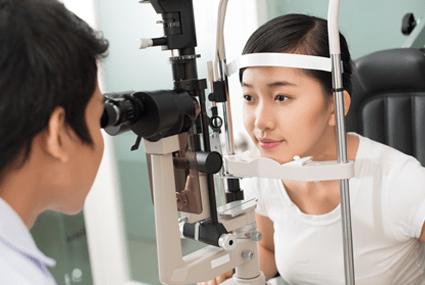
T1D Info
Healthcare Professionals
About Us
Type 1 Diabetes & eye complication
Edited: 14.07.2025

People with Type 1 Diabetes are more at risk to develop an eye disease called diabetic retinopathy which can affect their eyesight.
If your blood glucose level is consistently high, it can seriously damage your blood vessels. When it affects the blood vessels in your eyes it impacts the blood supply to the retina (the part of the eye that makes us able to see).
When these blood vessels are damaged it means the retina can’t get the blood it needs and so it can’t work properly. This means you won’t be able to see properly and you may become blind.
There are things that can be done to prevent vision loss, if the signs are caught early enough. The most important one is to ensure to keep your blood glucose level in the target range to avoid long-term complications. Yearly eye check can help your doctor detect eye problems early, before it leads to blindness.
A cataract, which is a thickening and clouding of the lens of the eye which blurs vision or makes it hard to see at night
Glaucoma, which is when the pressure builds up inside the eye which can decrease the blood flow to the retina and optic nerve, causing damage. Over time, if left untreated, glaucoma can lead to vision loss
Diabetic retinopathy, which involves changes in the retina due to damage or growth problems in the small blood vessels of the retina.
Diabetic retinopathy is the most common cause of vision loss for persons with diabetes. This is why diabetics need to manage their condition well in order to avoid this complication.
Diabetic retinopathy progresses gradually and damages a person’s eye over time. When left untreated, it can eventually lead to complete blindness.
Treatment for the early stages of diabetic retinopathy involve injecting medications into the eye itself to stop inflammation that causes the problem. But for more advanced complications of diabetic retinopathy, such as retinal detachment, eye surgery might be necessary.
Despite these forms of treatment, diabetic retinopathy isn’t fully reversible. Doctors can bring back some of a person’s vision, but it won’t go back to the way that it used to be.
The best way to see if you have eye problems is to have an eye doctor check your eyes. You can have eye damage even if your vision is fine. It has nothing to do with needing glasses.
It’s important to detect eye disease early and do something about it to prevent blindness. For that, you should have an eye screening organised every year. This is different to eye test by opticians where they help people with fitting glasses or contact lenses.
What is an eye screening for people with diabetes? An eye doctor will take a photo of each eye to look for any changes to your retina and any signs of retinopathy.
If it’s caught early, there are treatments that can be done to prevent vision loss. Your doctor can discuss this with you as long as you give him the results of your annual eye screening.
Always check your blood glucose level
Get your eyes screened every year
Spot changes to your eyesight including blurred vision (especially at night), shapes floating in your vision, sensitivity to light
Follow the healthy eating guidelines and avoid foods that contain bad carbohydrates like sugary drinks, desserts, and junk food like potato chips.
Try to exercise 30 min per day
Vision problems are a serious concern for persons with diabetes. If left unchecked, diabetes can adversely affect a person’s vision, and even lead to blindness.
This is why it is important for people with diabetes to manage their condition well since that is the best way to prevent the possible complications of diabetes. People living with Type 1 Diabetes are also at risk for conditions such as hypertension, heart disease, and kidney problems, so they need to always be on top of things so that they can remain healthy.